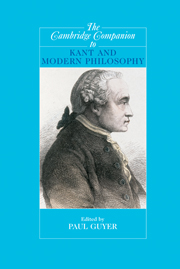Book contents
- Frontmatter
- Introduction: The starry heavens and the moral law
- 1 “A Priori”
- 2 Kant on the perception of space (and time)
- 3 Kant’s philosophy of mathematics
- 4 Kant on a priori concepts: The metaphysical deduction of the categories
- 5 Kant’s philosophy of the cognitive mind
- 6 Kant’s proofs of substance and causation
- 7 Kant and transcendental arguments
- 8 The critique of metaphysics: The structure and fate of Kant’s dialectic
- 9 Philosophy of natural science
- 10 The supreme principle of morality
- 11 Kant on freedom of the will
- 12 Mine and thine? The Kantian state
- 13 Kant on sex and marriage right
- 14 Kant’s theory of peace
- 15 Kant’s conception of virtue
- 16 Kant’s ambitions in the third Critique
- 17 Moral faith and the highest good
- 18 Kant’s critical philosophy and its reception - the first five years (1781-1786)
- Bibliography
- Index
12 - Mine and thine? The Kantian state
Published online by Cambridge University Press: 28 March 2007
- Frontmatter
- Introduction: The starry heavens and the moral law
- 1 “A Priori”
- 2 Kant on the perception of space (and time)
- 3 Kant’s philosophy of mathematics
- 4 Kant on a priori concepts: The metaphysical deduction of the categories
- 5 Kant’s philosophy of the cognitive mind
- 6 Kant’s proofs of substance and causation
- 7 Kant and transcendental arguments
- 8 The critique of metaphysics: The structure and fate of Kant’s dialectic
- 9 Philosophy of natural science
- 10 The supreme principle of morality
- 11 Kant on freedom of the will
- 12 Mine and thine? The Kantian state
- 13 Kant on sex and marriage right
- 14 Kant’s theory of peace
- 15 Kant’s conception of virtue
- 16 Kant’s ambitions in the third Critique
- 17 Moral faith and the highest good
- 18 Kant’s critical philosophy and its reception - the first five years (1781-1786)
- Bibliography
- Index
Summary
For if justice goes, there is no longer any value in human beings living on the earth.
(Morals, 6:332; 105)According to Kant, a
condition of the individuals within a people in relation to one another is called a civil condition (status civilis), and the whole of individuals in a rightful condition, in relation to its members is called a state (civitas).
(Morals, 6:311; 89)A fuller definition of such a state or civitas follows.
A state (civitas) is a union of a multitude of human beings under laws of right. Insofar as these are a priori necessary as laws, that is insofar as they follow of themselves from concepts of external right as such (are not statuary), its form is the form of a state as such, that is, of the state in idea, as it ought to be in accordance with pure principles of right. This idea serves as a norm (norma) for every actual union into a commonwealth (hence serves as a norm for its internal constitution).
(6:313; 90)This state is formally republican, in that the sovereign acts in the name of all subjects, and it should consist of a separation of (but not a true balance of) powers. The state's main function is the protection of property rights and the regulation of disputes about property and contract, and its sovereignty is absolute (there is no “right of revolution”; revolution is always absolutely forbidden).
- Type
- Chapter
- Information
- The Cambridge Companion to Kant and Modern Philosophy , pp. 416 - 446Publisher: Cambridge University PressPrint publication year: 2006
- 35
- Cited by



